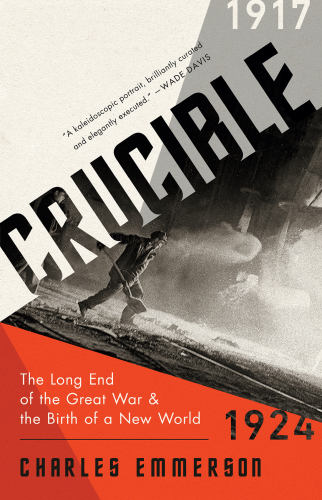
Crucible
The Long End of the Great War and the Birth of a New World, 1917-1924
کتاب های مرتبط
- اطلاعات
- نقد و بررسی
- دیدگاه کاربران
نقد و بررسی

September 1, 2019
An intimate survey of a critical transition point in modern history. Emmerson (1913: The Year Before the Great War, 2013, etc.) builds his history around a number of key personalities who shaped the era between 1917 and 1924, a time of betrayed idealism, social turmoil, and revolutions. Chief among them are Lenin, Trotsky, Mussolini, and Hitler, all of whom took their nations in directions that would eventually result in World War II. There are also plenty of interesting supporting players, including Kaiser Wilhelm, Woodrow Wilson, Winston Churchill, Irish revolutionary Éamon de Valera, and Turkish liberator Kemal Ataturk; black nationalist Marcus Garvey and his rival W.E.B. Du Bois; scientists Sigmund Freud and Albert Einstein; writers André Breton and Ernest Hemingway; singer and dancer Josephine Baker; and a host of others. The author tells the story by giving each of his characters a few paragraphs, then moving on to another, with the overall chronological narrative organized by the seasons of the year. This approach is especially valuable in giving readers a sense of the career arcs of significant historical figures along with a solid feel for the landscape of Europe 100 years ago. The focus is on Europe, although the United States is by no means neglected, especially in terms of racial tensions and the anti-Semitic writings of Henry Ford, whom Hitler admired and at one point hoped to win support from. Throughout this comprehensive history, there are few missteps. Emmerson does gloss over the sinking of the Lusitania, a key driver of American entry in the war, and he also uses nicknames for several major players--Lenin is "the impatient revolutionary," Hitler "the mangy field-runner"--which he repeats constantly. Nonetheless, the author provides an illuminating picture of how the world moved from a "war to end all wars" to an era of dictators and toxic nationalism. A fascinating slice of history told through the daily lives of some of its iconic figures.
COPYRIGHT(2019) Kirkus Reviews, ALL RIGHTS RESERVED.

























دیدگاه کاربران